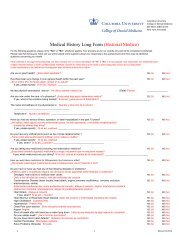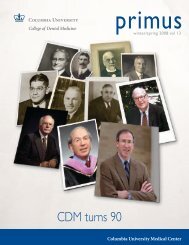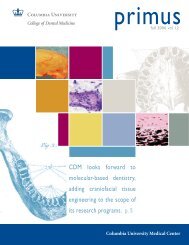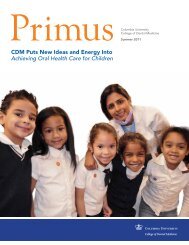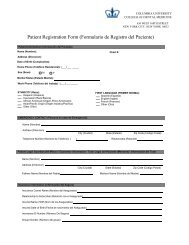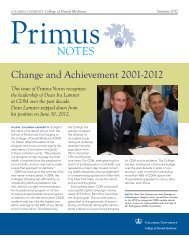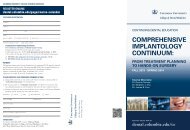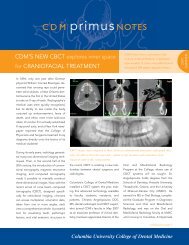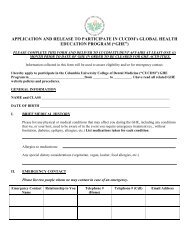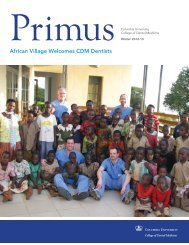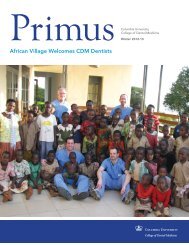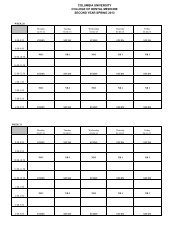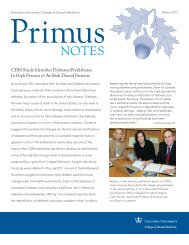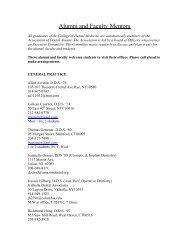Jarvie Journal - College of Dental Medicine - Columbia University
Jarvie Journal - College of Dental Medicine - Columbia University
Jarvie Journal - College of Dental Medicine - Columbia University
You also want an ePaper? Increase the reach of your titles
YUMPU automatically turns print PDFs into web optimized ePapers that Google loves.
The <strong>Journal</strong> <strong>of</strong> the William <strong>Jarvie</strong> Society<br />
ECC Risk Associated with Dietary Changes in WA Immigrant Families in<br />
the Bronx<br />
Ann Layvey 1 , Burton L. Edelstein 2<br />
1 <strong>Columbia</strong>-New York Presbyterian Hospital, Residency Program in Pediatric Dentistry, 2 Section <strong>of</strong> Social and<br />
Behavioral Sciences; both within <strong>Columbia</strong> <strong>University</strong> <strong>College</strong> <strong>of</strong> <strong>Dental</strong> <strong>Medicine</strong>, New York, NY; * Faculty Mentor<br />
Introduction: Early childhood caries (ECC) is diet-dependent, highly prevalent, and unevenly<br />
distributed with low income, minority, and immigrant children most affected. Caries activity is<br />
environmentally determined by factors including behavioral, dietary, educational, and socioeconomic<br />
characteristics. These factors, which are also affected by culture and acculturation, are <strong>of</strong> interest to this<br />
investigation. We hypothesize, based on relevant socio-behavioral theory, that acculturation-related<br />
dietary changes made by West African (WA) parents will impact the dental health <strong>of</strong> their children.<br />
Objective: To develop a theory-based survey to determine whether diet related acculturation impacts<br />
risk for ECC in a population <strong>of</strong> WA immigrant families in The Bronx, New York City. The survey will<br />
determine: (1) whether acculturation related dietary changes have resulted in increased dietary caries risk<br />
in preschoolers in this community; and (2) WA immigrant parents' knowledge about infant and child oral<br />
health recommendations in the US.<br />
Materials & Methods: The study involves first-generation English-speaking WA immigrant parents <strong>of</strong><br />
preschoolers who present to a WA church. Survey questions were developed to test a series <strong>of</strong><br />
hypotheses about the potential effect <strong>of</strong> acculturation on dietary and feeding practices and were informed<br />
by the immigration and cariology literature and by experts in cariogenic diets. 44 WA parents<br />
participated in the study. The survey consisted <strong>of</strong> 28 questions regarding parental diet pre- and postimmigration,<br />
their children’s diet, their knowledge about children's oral health, and their social and built<br />
environments.<br />
Results & Conclusion: According to this pilot study, dietary related acculturation is least likely to occur<br />
when the WA parent is 22 years or older before immigrating to the United States. In addition, the older<br />
the parent prior to immigrating, the more the parent is likely to begin brushing their child’s teeth at 6<br />
months-1year <strong>of</strong> age.<br />
Discussion: Studies have shown increased risk for caries in children <strong>of</strong> different immigrant populations,<br />
for example, Hispanics, due to dietary related acculturation. In this study we hypothesize that dietary<br />
changes in WA parents will impact dental health <strong>of</strong> their children. Although our findings are not<br />
statistically significant, there appears to be a trend that dietary changes does occurs in this populace<br />
towards a more cariogenic diet. A larger sample size may be needed to detect significance.<br />
Research supported by the Health Resources and Services Administration Maternal and Child Health Bureau:<br />
Leadership Training in Pediatric Dentistry Grant T17MC06359<br />
Post-doctoral Training in Pediatric Dentistry Grant D88HP20109<br />
60



